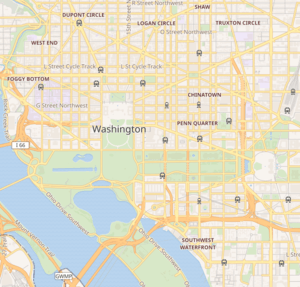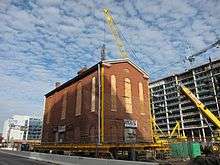Lillian & Albert Small Capital Jewish Museum
The Capital Jewish Museum, officially the Lillian & Albert Small Capital Jewish Museum, is a historical society and its planned museum in Washington, D.C., focused on the history of Jewish life in the American capital city and the surrounding Washington metropolitan area.
 | |
 Location within central Washington, D.C.  Location within the District of Columbia | |
| Former name |
|
|---|---|
| Established |
|
| Location | Washington, D.C., US |
| Type |
|
| Website | capitaljewishmuseum |
Adas Israel Synagogue (original) | |
Adas Israel Synagogue in 2008 | |
| Location | 701 3rd Street NW Washington, D.C. |
| Coordinates | 38°53′54.6″N 77°0′54″W |
| Built | 1876 |
| Architect | Max Kleinman; J. William & Co. |
| NRHP reference No. | 69000288 [1] |
| Added to NRHP | March 24, 1969 |
Formerly known as the Jewish Historical Society of Greater Washington (JHSGW), the organization adopted a new name in 2018 as it prepared for the opening of its new museum facility, expected in 2021.[2] The organization was founded in 1960 and incorporated as a nonprofit organization in 1965.[3] From 1975 to 2016, it operated the Lillian & Albert Small Jewish Museum in the historic Adas Israel Synagogue building, an 1876 structure that is the oldest surviving synagogue in the city.[3][4][5] The synagogue building has been moved three times in its history, with a final move in 2019 to become part of the planned Capital Jewish Museum.[6][7][8]
Planned museum
Plans call for the Capital Jewish Museum to be a $34 million, 25,000-square-foot (2,300-square-meter) facility located in the Judiciary Square and Capitol Crossing neighborhood of Northwest Washington, D.C.[6][9] According to the organization, the new four-story building at 701 F Street Northwest will include three floors of exhibit and programming space. It will incorporate the historic synagogue that formerly housed the museum, with the sanctuary "restored to its original appearance."[9][10] The museum refers to the historic synagogue as the "centerpiece" and "largest artifact" of the new museum.[9] Other artifacts in the museum's collection include a lace collar worn by U.S. Supreme Court Justice Ruth Bader Ginsburg; a notebook used by Supreme Court Justice Louis Brandeis;[11] photographs of Jewish life in Washington, such as a 1925 image of President Calvin Coolidge dedicating a local Jewish Community Center;[6] a banner carried by Jewish lobbyist Hyman Bookbinder at the 1963 March on Washington;[5] a kippah (yarmulke) from a White House Hanukkah celebration; and items from local Jewish businesses and families, such as a bookstore sign and a wedding cup.[12]
Historic Adas Israel Synagogue
The historic Adas Israel Synagogue was built in 1876 at 6th and G Streets, Northwest to house the Adas Israel Congregation. President of the United States Ulysses S. Grant attended the synagogue's dedication on June 9, 1876, marking the first Jewish service attended by a sitting president.[13] The building is the oldest surviving synagogue building in the District of Columbia.

Over the following decades, an influx of immigrants from Eastern Europe and Russia swelled the congregation's numbers. The congregation continued to worship in the original synagogue until 1908, when a new building at Sixth and I Streets, NW was dedicated. The congregation later moved again, and the latter building is known today as the Sixth & I Historic Synagogue.[6][14]
The original 1876 building was sold to Stephen Gatti, an Italian-American fruit dealer and real estate investor who lived a block away. In the 1910s, Saint Sophia's Greek Orthodox Church worshiped in the second-floor sanctuary. A succession of churches followed in the 1920s to 1940s. During the course of the next 60 years, the former synagogue's first floor was divided into retail spaces and housed a bicycle shop, barber, Joseph Funger's grocery store, Anthony Litteri's delicatessen, and other businesses.[6]
In the 1960s, plans for the construction of the Washington Metropolitan Area Transit Authority headquarters at the 6th and G intersection threatened the building with demolition.[6] With the support of federal and city agencies, the Jewish Historical Society of Greater Washington arranged to move the building three city blocks to Third and G Streets, NW.[13] On September 1, 1969, President Richard Nixon signed a law authorizing the District of Columbia government to purchase the building and lease it to the Society for historic preservation purposes at $1 a year for 99 years.
The historic synagogue building was restored by the Jewish Historical Society of Greater Washington and became the home of the Lillian & Albert Small Jewish Museum starting in 1975.[15]
The historic synagogue building is listed on the National Register of Historic Places, the District of Columbia Inventory of Historic Sites, and Historic American Buildings Survey. It is among the oldest synagogue buildings still standing in the United States.[16] It is also an official project of the Save America's Treasures program.
Relocation to Capital Jewish Museum site (2016-2021)
Starting in 2016, the development of the Capitol Crossing project required the building to move again, as the District of Columbia government sold the land on which it sat.[13] In response, the museum was closed so that the building could be moved to a new permanent home, where it would re-open as part of a new museum building that would be constructed around the historic synagogue.
The move proceeded in two stages. First, the structure was first moved about 50 feet to a temporary location on Third Street NW, to await the construction of a parking garage that would serve as its permanent base.[13] Then, in early 2019, the building was moved to its final stop at the corner of Third and F Streets, Northwest. Local elected officials attended the move and gave speeches, and a rabbi offered a traveler's prayer.[11] At the new location, the synagogue will face east, in accordance with Jewish custom.[6] It will be part of the Capital Jewish Museum to be opened to the public in 2021.
See also
References
- "National Register Information System". National Register of Historic Places. National Park Service. April 15, 2008.
- "About Us". Capital Jewish Museum. Retrieved 2019-11-06.
- "Mission & History | Jewish Historical Society of Greater Washington | Lillian and Albert Small Jewish Museum". Jewish Historical Society of Greater Washington. Archived from the original on 2016-06-23. Retrieved 2019-11-18.
- "About Us". Capital Jewish Museum. Retrieved 2019-11-18.
- ABC7, John Gonzalez and Sam Ford (2019-01-09). "DC's oldest synagogue moves to site of new Capital Jewish Museum". WJLA. Retrieved 2019-11-18.
- Lefrak, Mikaela (2019-01-09). "Yes, That Was D.C.'s Oldest Synagogue Moving Down The Street (Again)". WAMU. Retrieved 2019-07-03.
- Myers, Phyllis (August 14, 2005). "The Temple That Traveled". Washington Post. Retrieved May 22, 2018.
- "Historic Synagogue". Capital Jewish Museum. Retrieved 2019-11-06.
- "Making the Museum". Capital Jewish Museum. Retrieved 2019-11-18.
- Lillian & Albert Small Capital Jewish Museum / Jewish Historical Society of Greater Washington (2018). "2018 Annual Report" (PDF). Lillian & Albert Small Capital Jewish Museum. Retrieved 2019-11-18.
- Malet, Jeff (2019-01-10). "Oldest Synagogue Building Moves to New D.C. Site (photos)". The Georgetowner. Retrieved 2019-11-18.
- "Collections". Capital Jewish Museum. Retrieved 2019-11-18.
- Austermuhle, Martin (2016-11-03). "A 273-Ton D.C. Synagogue Is Being Moved To Make Way For Development. Again". WAMU. Retrieved 2019-07-03.
- "National Register of Historic Places Inventory - Nomination Form". National Park Service. December 1968. Retrieved June 6, 2013.
- "Lillian & Albert Small Jewish Museum | AMERICAN HERITAGE". www.americanheritage.com. Retrieved 2019-11-06.
- Gordon, Mark W. (1996). "Rediscovering Jewish Infrastructure: Update on United States Nineteenth Century Synagogues". American Jewish History. Project MUSE, Johns Hopkins University. 84 (1): 11–27. Retrieved May 22, 2018 – via jhu.edu. 2019 article update.
External links
| Wikimedia Commons has media related to Lillian & Albert Small Jewish Museum. |